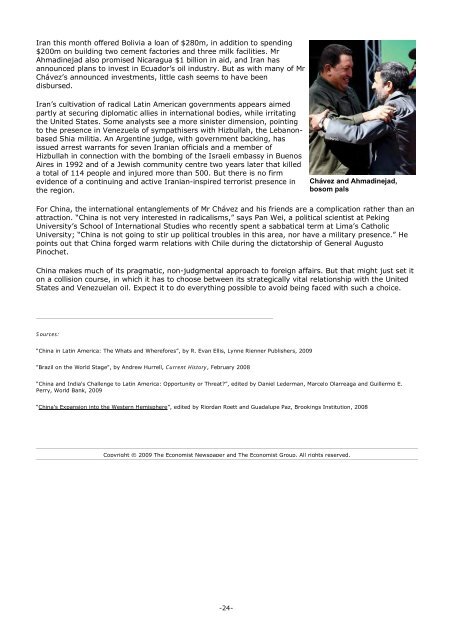Untitled - the ultimate blog
Untitled - the ultimate blog
Untitled - the ultimate blog
You also want an ePaper? Increase the reach of your titles
YUMPU automatically turns print PDFs into web optimized ePapers that Google loves.
Iran this month offered Bolivia a loan of $280m, in addition to spending<br />
$200m on building two cement factories and three milk facilities. Mr<br />
Ahmadinejad also promised Nicaragua $1 billion in aid, and Iran has<br />
announced plans to invest in Ecuador’s oil industry. But as with many of Mr<br />
Chávez’s announced investments, little cash seems to have been<br />
disbursed.<br />
Iran’s cultivation of radical Latin American governments appears aimed<br />
partly at securing diplomatic allies in international bodies, while irritating<br />
<strong>the</strong> United States. Some analysts see a more sinister dimension, pointing<br />
to <strong>the</strong> presence in Venezuela of sympathisers with Hizbullah, <strong>the</strong> Lebanonbased<br />
Shia militia. An Argentine judge, with government backing, has<br />
issued arrest warrants for seven Iranian officials and a member of<br />
Hizbullah in connection with <strong>the</strong> bombing of <strong>the</strong> Israeli embassy in Buenos<br />
Aires in 1992 and of a Jewish community centre two years later that killed<br />
a total of 114 people and injured more than 500. But <strong>the</strong>re is no firm<br />
evidence of a continuing and active Iranian-inspired terrorist presence in<br />
<strong>the</strong> region.<br />
Chávez and Ahmadinejad,<br />
bosom pals<br />
For China, <strong>the</strong> international entanglements of Mr Chávez and his friends are a complication ra<strong>the</strong>r than an<br />
attraction. “China is not very interested in radicalisms,” says Pan Wei, a political scientist at Peking<br />
University’s School of International Studies who recently spent a sabbatical term at Lima’s Catholic<br />
University; “China is not going to stir up political troubles in this area, nor have a military presence.” He<br />
points out that China forged warm relations with Chile during <strong>the</strong> dictatorship of General Augusto<br />
Pinochet.<br />
China makes much of its pragmatic, non-judgmental approach to foreign affairs. But that might just set it<br />
on a collision course, in which it has to choose between its strategically vital relationship with <strong>the</strong> United<br />
States and Venezuelan oil. Expect it to do everything possible to avoid being faced with such a choice.<br />
Sources:<br />
“China in Latin America: The Whats and Wherefores”, by R. Evan Ellis, Lynne Rienner Publishers, 2009<br />
"Brazil on <strong>the</strong> World Stage", by Andrew Hurrell, Current History, February 2008<br />
“China and India's Challenge to Latin America: Opportunity or Threat?”, edited by Daniel Lederman, Marcelo Olarreaga and Guillermo E.<br />
Perry, World Bank, 2009<br />
“China's Expansion into <strong>the</strong> Western Hemisphere”, edited by Riordan Roett and Guadalupe Paz, Brookings Institution, 2008<br />
Copyright © 2009 The Economist Newspaper and The Economist Group. All rights reserved.<br />
-24-








![[ccebbook.cn]The Economist August 1st 2009 - the ultimate blog](https://img.yumpu.com/28183607/1/190x252/ccebbookcnthe-economist-august-1st-2009-the-ultimate-blog.jpg?quality=85)



![[ccebook.cn]The World in 2010](https://img.yumpu.com/12057568/1/190x249/ccebookcnthe-world-in-2010.jpg?quality=85)
![[ccemagz.com]The Economist October 24th 2009 - the ultimate blog](https://img.yumpu.com/5191885/1/190x252/ccemagzcomthe-economist-october-24th-2009-the-ultimate-blog.jpg?quality=85)